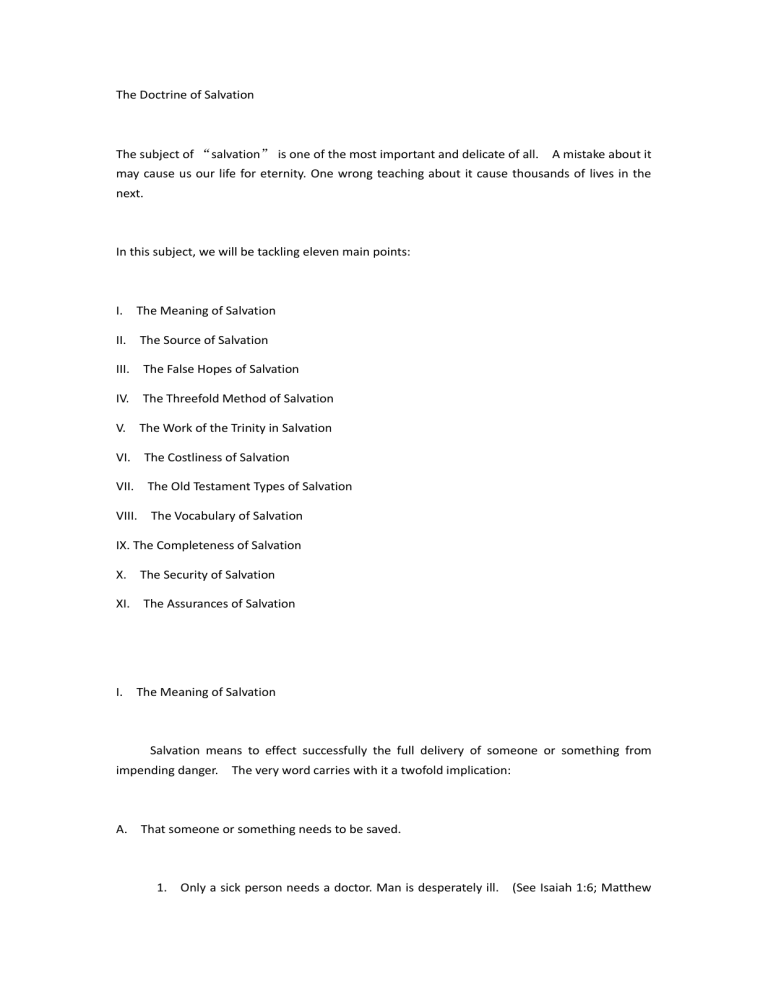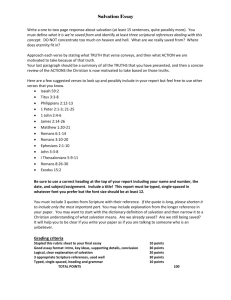
The Doctrine of Salvation The subject of “salvation” is one of the most important and delicate of all. A mistake about it may cause us our life for eternity. One wrong teaching about it cause thousands of lives in the next. In this subject, we will be tackling eleven main points: I. The Meaning of Salvation II. The Source of Salvation III. The False Hopes of Salvation IV. The Threefold Method of Salvation V. The Work of the Trinity in Salvation VI. The Costliness of Salvation VII. The Old Testament Types of Salvation VIII. The Vocabulary of Salvation IX. The Completeness of Salvation X. The Security of Salvation XI. The Assurances of Salvation I. The Meaning of Salvation Salvation means to effect successfully the full delivery of someone or something from impending danger. The very word carries with it a twofold implication: A. That someone or something needs to be saved. 1. Only a sick person needs a doctor. Man is desperately ill. (See Isaiah 1:6; Matthew 9:12) 2. Only an accused person needs a lawyer. Man stands condemned in God’ court of law. (See Romans 3:10-19) 3. Only a drowning person needs a lifeguard. Man finds himself flooded by the waters of sin. (See Psalm 69: 1, 2) 4. In his excellent book, Salvation is Forever, Robert Gromacki lists the following reasons why men are lost. They are because… a. Of their rejection of biblical revelation (Psa. 19:1; Acts 14:17; Romans 1:19-20). b. Of disobeying their own conscience (Rom. 2:14-16). c. Of their relationship to the world (Eph. 2:2; Jam. 4:4; 1 Jo. 2:15-17). d. of their relationship to Satan (Matt. 4:8, 9; Jo. 8:42-44; 12:31; 2 Cor. 4:4; Col. 1:13; 1 Jo. 3:10; 5:19). e. Of their relationship to sin (Gen. 2:17; 8:21; Job 14:4; Eccl. 7:20: Jer. 17:19; Mark 7:20-23; Rom. 5:12; 7:14; Eph. 4:18). f. Of their relationship to God (Jo. 3:36; Eph. 2:12; 1 Jo. 5:12; Jude 1:19) B. That someone is able and willing to save. Such a Savior must fulfill both requirements. 1. He must be able to save. It is possible for a person to have a desire but not the ability to save another individual. Many a physician has stood in utter frustration beside the bed of his dying patient, wanting so much to give aid, but totally helpless to do so. 2. He must be willing to save. It is possible for a person to have the ability but not the desire to save another individual. In 1978 a man in the United States, in desperate need of a rare blood transfusion, died. The tragedy of the story was that he suffered and died needlessly, for one of his own relatives possessed the rare type of blood and could have easily donated some, but stubbornly refused. Perhaps the greatest ability after all is availability. II. The Source of Salvation. Jesus Christ is the source of salvation. He meets both requirements. A. He is able to save. Hebrews 2:18 “For in that he himself hath suffered being tempted, he is able to succour them that are tempted.” Ephesians 3:20 “Now unto him that is able to do exceeding abundantly above all that we ask or think, according to the power that worketh in us,” 2 Timothy 1:12 “For the which cause I also suffer these things: nevertheless I am not ashamed: for I know whom I have believed, and am persuaded that he is able to keep that which I have committed unto him against that day.” Hebrews 7:25 “Wherefore he is able also to save them to the uttermost that come unto God by him, seeing he ever liveth to make intercession for them.” Jude 1:24 “Now unto him that is able to keep you from falling, and to present you faultless before the presence of his glory with exceeding joy,” B. He is willing to save. Matthew 8:2-3 “And, behold, there came a leper and worshipped him, saying, Lord, if thou wilt, thou canst make me clean. And Jesus put forth his hand, and touched him, saying, I will; be thou clean. And immediately his leprosy was cleansed.” 1 Timothy 2:3-4 “For this is good and acceptable in the sight of God our Saviour; Who will have all men to be saved, and to come unto the knowledge of the truth.” 2 Peter 3:9 “The Lord is not slack concerning his promise, as some men count slackness; but is longsuffering to us-ward, not willing that any should perish, but that all should come to repentance.” III. The False Hopes of Salvation Proverbs 14:12 “There is a way which seemeth right unto a man, but the end thereof are the ways of death.” A. Education. On two separate occasions Paul warns Timothy about the folly of depending on education. 1 Timothy 6:20 “O Timothy, keep that which is committed to thy trust, avoiding profane and vain babblings, and oppositions of science falsely so called:” 2 Timothy 3:7 “Ever learning, and never able to come to the knowledge of the truth.” B. Church membership C. Good works (Eph. 2:8, 9) D. Baptism (1 Cor. 1:17) E. Proper environment F. Keeping the law (Gal. 2:16) G. Confirmation. Religious confirmation is as far removed from redemption ’ s transformation as a lump of coal from a glittering diamond. H. Living by the Golden Rule. I. Sincerity. J. Lodge membership. K. Tithing. L. Secular organization. (See Psa. 2; Rev. 18) M. Religious organizations. (See Rev. 17) IV. The Threefold Method of Salvation. While God has indeed dealt with His creatures under different dispensations (the pre-law stages, the age of the law, the post law stage, etc.), he saves them all by the identical threefold method: A. Salvation is always by blood (Heb. 9:22). Furthermore, this blood must be innocent, shed, and applied. B. Salvation is always through a person Jonah 2:9 “But I will sacrifice unto thee with the voice of thanksgiving; I will pay that that I have vowed. Salvation is of the LORD.” Acts 4:12 “Neither is there salvation in any other: for there is none other name under heaven given among men, whereby we must be saved.” 1 Thessalonians 5:9 “For God hath not appointed us to wrath, but to obtain salvation by our Lord Jesus Christ,” Hebrews 5:9 “And being made perfect, he became the author of eternal salvation unto all them that obey him;” C. Salvation is always by grace (Eph. 2:8, 9; Tit. 2:11). 1. This grace is preceded by the sinner’s faith (Rom. 5:1; Heb. 11:6). 2. This grace is followed by the Savior’s peace (Rom. 1:7; 1 Cor. 1:3; Gal. 1:3).




